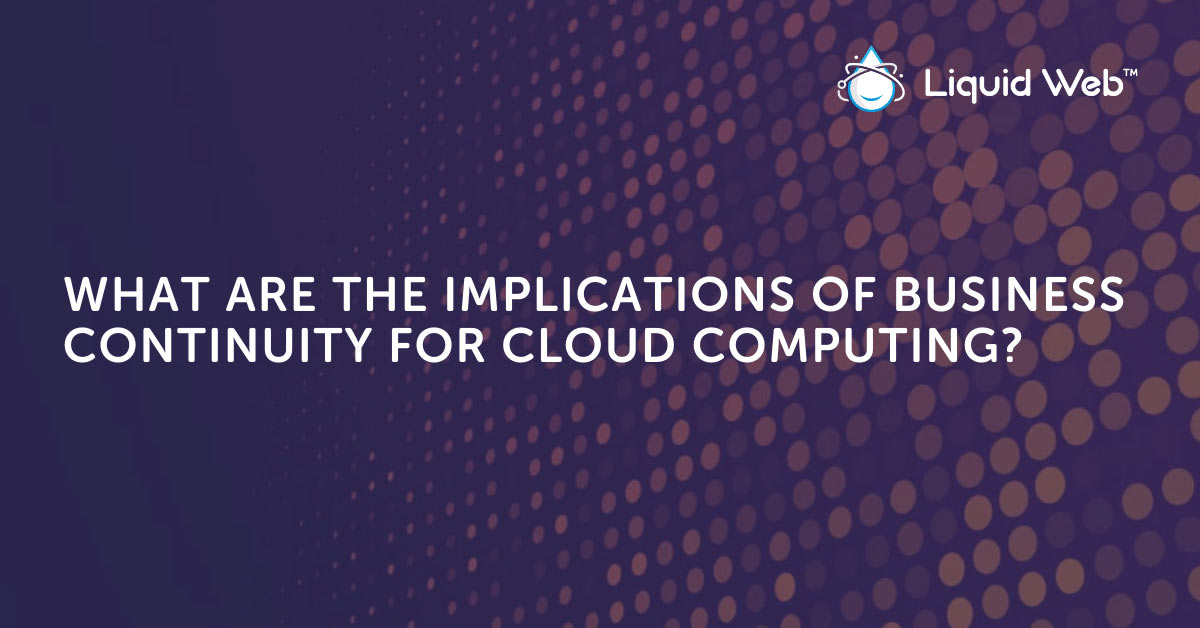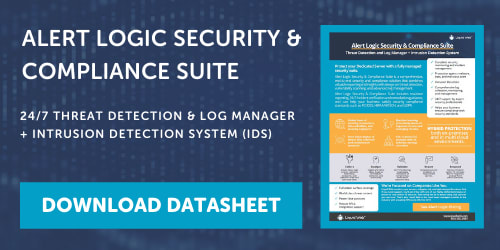
Cloud computing has revolutionized the way that almost every organization approaches business continuity. Even ten years ago, most companies maintained large amounts of expensive equipment in their offices. Today, thanks to services like Liquid Web’s Managed Cloud Hosting, server rooms have disappeared from most offices, and business continuity cloud is becoming mainstream. Unfortunately, it is the convenience of cloud services that can make them a real risk for business continuity.
The speed at which the cloud revolution has occurred has been due, in no small part, to how easy it has been for firms to adopt cloud models. Software-as-a-Service (SaaS) allows organizations to essentially sub-contract large portions of their IT and data management functions; everything from disk capacities to secure access being taken care of by their cloud provider.
It can be tempting for organizations to simply forget about continuity planning after moving to a cloud model.
We’ll dive into considerations you need to ask as you implement business continuity for your new cloud setup.
What is Business Continuity?
Business continuity involves a higher-level set of plans than those related to disaster recovery and seeks to ensure that your business can continue to function even as it recovers from a disaster safely. Business continuity is a process that looks to build resilience rather than solving immediate issues.
Because of this, the best business continuity plans tend to take a holistic approach, one that defines how your business will react to difficulties in its dealings with multiple groups. Ensuring business continuity entails clear communication with customers, staff, and contractors.
It means working collaboratively with your business partners and your cloud provider in particular.
Business continuity planning is often confused with several similar processes, which is why so many companies overlook its importance. There is a distinction between business continuity planning and disaster recovery planning.
What is Disaster Recovery (DR) Planning?
Disaster recovery planning covers how you react to natural and man-made disasters, ranging from insider threats to the fallout from a massive data breach. Because of this, disaster recovery plans generally define many acute problems and spell out how they can be solved.
Moving to the Cloud
Moving to cloud systems can make your business more efficient, more adaptive, and ultimately more profitable. Taking this step requires careful planning, especially when it comes to thinking about business continuity in the cloud.
In many ways, SaaS and IaaS (Infrastructure-as-a-Service) models have become victims of their own success because they are simply too easy for businesses not to take advantage of their services. The marketplace for cloud providers is a highly crowded one. As a result, providers typically offer to take care of every aspect of system and data management, all at a low price.
Understandably, this can lead to businesses forgetting about critical aspects of their business continuity planning and assuming their cloud provider will be handling them.
This is a real concern for security analysts, who are increasingly worried that massive amounts of public data are concentrated in one or two clouds – 63% of people use Google Chrome, for instance, which means that one company has responsibility for protecting a good proportion of the world’s data. If these clouds were to suffer a catastrophic failure, this could mean that hundreds (or perhaps hundreds of thousands) of businesses would be rendered mute.
In reality, moving your business to cloud systems necessitates that you assess whether your chosen provider can contribute to your company’s resilience. It’s important to recognize that cloud providers vary significantly when it comes to the level of support they offer. Some merely supervise the execution of your business continuity and disaster recovery plans, while others may be able to execute the plan on your behalf.
That’s why 68% of companies cited cloud misconfiguration as the top concern for keeping their data and infrastructure safe. A whopping 52% of organizations found insecure interfaces another top concern for their cloud, which is why you need the best security practices for cloud systems.

Four Considerations for Maintaining Business Continuity
When it comes to maintaining business continuity during (and after) a move to cloud infrastructure, there are four key considerations:
- Ensure that your provider can give you the level of access to data that you need. The service agreement should spell out this information and acknowledge that you are unlikely to be the only company your cloud provider does business with.
- Ensure you know how to access your data in an emergency that affects either you or your cloud provider. For most organizations, this means making regular, local backups of critical data.
- Check the level of support offered by your cloud provider. You should be clear on how much support they provide and through which hours they do so.
- Have a plan for what happens if your cloud provider experiences a disaster. Business continuity plans should include contingencies for a total (and potentially permanent) loss of all the data you have stored in the cloud. If you don’t know how you would keep your business running in that circumstance, more continuity planning is required.
What To Look For in a Cloud Host
As we’ve seen, your business continuity planning strength and your business’s resilience are dependent on your cloud provider. Coupled with recognizing the range of cloud services that are now available, this indicates that choosing the right cloud provider is one of the most crucial business decisions that most firms will make.
It’s therefore essential to perform due diligence on your cloud provider. Here are some key questions to ask in your search:
- Are they guiding you through the process?
- Do they validate what you actually need?
- Do they show restraint but plan for growth?
- Are they providing a positive return on investment?
- Do they support your business and users alike?
The best cloud providers offer 24/7 customer support and precisely spell out their responsibilities during and after a disaster. The best may even ask to share business resilience plans so that you can both determine how to support each other.
Sophisticated Security as Part of Your Business Continuity Plan
A high-quality cloud host will provide you with sophisticated security so that your data is kept safe. Data security is arguably the most important cloud host feature. Ensure that your cloud host can provide the following:
- Security and Data Breach Processes: All cloud hosts will have encountered security threats, so make sure yours can explain how they deal with these and how they react to a data breach.
- Encryption: Even some consumer-focused clouds are now end-to-end encrypted. Any cloud system used for business should be encrypted.
- Security Add-Ons: A high-quality cloud host may provide you with security add-ons to increase the level of protection for your data.
Ultimately, data security was one of the primary promises of the advent of SaaS models, so you need to ensure that you are being offered an adequate level of protection for your business and budget.
Alert Logic Security and Compliance Suite Can Help
Moving to the cloud comes with several opportunities. It’s important to re-evaluate business continuity plans after you’ve moved to the cloud, because you may not need to be as resilient internally due to having a particular SaaS solution.
Our Alert Logic Security and Compliance Suite is a comprehensive, end-to-end security and compliance solution that combines valuable reporting and insights with always-on threat detection, vulnerability scanning, and advanced log management. It provides all the functionality and security you need to ensure business continuity while also enjoying the benefits of cloud systems.
[ad_2]
Source link







